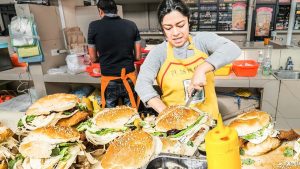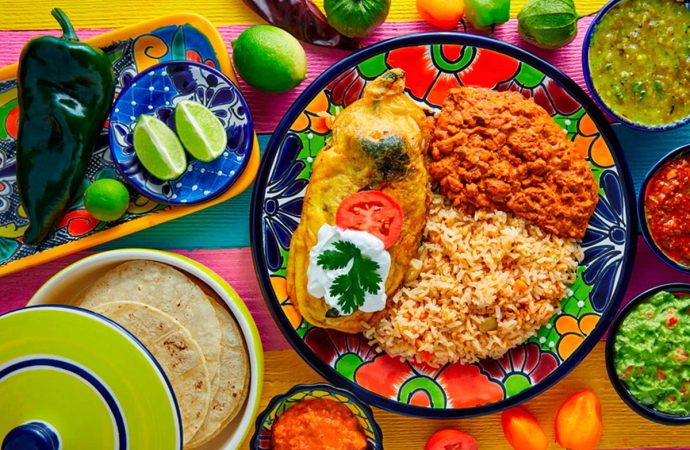Introduction The Mexico foodservice market is poised for significant expansion, with its estimated value at USD 65.4 billion in 2024 projected to reach USD 148.26 billion by 2033, reflecting a robust compound annual growth rate (CAGR) of 9.52% over the forecast period. The growth trajectory is primarily driven by rapid urbanization, rising disposable incomes, a
Introduction
The Mexico foodservice market is poised for significant expansion, with its estimated value at USD 65.4 billion in 2024 projected to reach USD 148.26 billion by 2033, reflecting a robust compound annual growth rate (CAGR) of 9.52% over the forecast period. The growth trajectory is primarily driven by rapid urbanization, rising disposable incomes, a flourishing tourism industry, and evolving consumer lifestyles that increasingly favor convenience, variety, and digital ordering platforms across quick-service, casual dining, and full-service restaurant formats.
Request a free sample copy of the report: https://www.renub.com/request-sample-page.php?gturl=mexico-foodservice-market-p.php
Overview of the Mexico Foodservice Market
The foodservice industry in Mexico encompasses all establishments that prepare, serve, and retail food and beverages outside the home. This includes restaurants, cafes, hotels, catering services, food trucks, institutional cafeterias, and online food ordering platforms. The sector caters to a wide spectrum of dining experiences, ranging from fast food and casual dining to gourmet and fine dining.
Foodservice plays a pivotal role in Mexico’s economy, contributing not only to employment but also to cultural and social life. The country’s rich gastronomic heritage, coupled with rising urban populations and a growing middle class, supports a strong demand for varied food offerings. From traditional street tacos to upscale international restaurants, the market reflects Mexico’s cultural diversity and evolving consumption patterns. Digitalization has further accelerated growth by enabling convenient ordering, home delivery, and table reservations through mobile applications and online platforms.
Increasing disposable income, lifestyle changes, and a tech-savvy consumer base are major factors driving the trend of eating out. Convenience, flavor, and social experiences continue to underpin the growth of Mexico’s foodservice industry, with consumers increasingly prioritizing experiences over mere sustenance.
Key Growth Drivers in the Mexico Foodservice Market
1. Urbanization and Lifestyle Shifts
Rapid urbanization in Mexico is transforming lifestyle patterns, leading to greater demand for convenient food options. Busy city dwellers increasingly rely on quick-service restaurants, casual dining, and online food delivery platforms, reducing the need for home-cooked meals. This shift fuels expansion in both brick-and-mortar and digital foodservice channels, making dining out an integral part of urban living.
2. Rising Disposable Income and Expanding Middle Class
Economic growth and a growing middle class have substantially increased consumer spending on foodservice. Higher disposable income encourages frequent restaurant visits and experimentation with international cuisines and premium dining options. Customers are willing to pay for quality, ambiance, and convenience, driving investment in full-service restaurants, food courts, and quick-service chains. Both domestic and international foodservice brands benefit from this surge in consumer spending.
3. Proliferation of Online Food Delivery Platforms
The rise of digital platforms such as Uber Eats, Rappi, and Didi Food has revolutionized foodservice in Mexico. Consumers now enjoy enhanced convenience, variety, and accessibility, which extends to previously underserved markets. Restaurants benefit from expanded reach and valuable data insights, while customers gain more choices and faster service. The COVID-19 pandemic accelerated this trend, and high mobile penetration, smartphone usage, and contactless payment adoption continue to support its growth.
Challenges Facing the Mexico Foodservice Market

Image by: Yandex.com
1. Dominance of Informal Sector and Market Fragmentation
Mexico’s informal food sector, including street vendors and small-scale eateries, poses challenges for formal foodservice businesses. These unlicensed and unregulated operators often offer lower prices, creating competitive pressure. Fragmentation leads to inconsistencies in food quality and safety, making it difficult for large-scale operators to capture market share. Despite regulatory efforts, enforcement varies across regions.
2. Economic Volatility and Inflation
Fluctuations in the Mexican economy, including rising inflation and currency volatility, affect operational costs for foodservice businesses. Increases in ingredient, labor, and utility costs can compress profit margins, and consumers may reduce discretionary spending during economic downturns. Small and medium-sized operators without scale advantages face significant pressure under these conditions.
Get Customization in the Report: https://www.renub.com/request-customization-page.php?gturl=mexico-foodservice-market-p.php
Segment Analysis of the Mexico Foodservice Market
1. Commercial Foodservice
Commercial foodservice includes full-service restaurants, cafes, bars, fast food chains, and food trucks. Urbanization, tourism, and consumer spending drive this segment. Commercial establishments are more adaptable to trends such as plant-based menus, fusion cuisine, and sustainability initiatives. The sector benefits from digital ordering and delivery integration, making it a dynamic and fast-growing part of the foodservice industry.
2. Traditional Foodservice
Traditional foodservice encompasses institutions like hospitals, schools, corporate cafeterias, government buildings, and prisons, which typically prepare meals on-site or through outsourced suppliers. Demand is driven by public investment in education and healthcare, providing stable, long-term growth opportunities. Food safety and nutrition are critical, and while less flexible than commercial operations, this segment remains essential for institutional catering providers.
3. Fast Food Foodservice
Fast food remains one of the most consumed and fastest-growing segments in Mexico. Its appeal lies in affordability, speed, and convenience, particularly among urban youth and working-class consumers. International brands like McDonald’s, Burger King, and KFC compete with local chains and street food operators. The integration of digital delivery, menu localization, and healthier options aligns with evolving consumer preferences, ensuring sustained growth, especially in urban and highway markets.
4. Full-Service Foodservice
Full-service restaurants offer sit-down dining with table service, catering to family, casual, and fine dining experiences. Growth in this segment is driven by increased spending and demand for diverse culinary experiences. International cuisines, chef-led concepts, and themed restaurants enhance its appeal. Despite higher operational costs and sensitivity to economic fluctuations, full-service restaurants benefit from strong brand recognition and experiential value.
Regional Insights
1. Northern Mexico
Northern states, including Monterrey, Tijuana, and Ciudad Juárez, have a vibrant foodservice market influenced by U.S. trade, tourism, and consumer behavior. Fast-casual and international cuisines are in high demand, and American brands often pilot operations here due to cultural and economic alignment. Proximity to the U.S. facilitates cross-border food trends, imports, and hybrid culinary offerings.
2. Southern Mexico
Southern regions such as Oaxaca, Chiapas, and Yucatán are characterized by traditional and indigenous food culture. The market is fragmented, with a mix of local eateries, markets, and street vendors. Tourism, particularly in cities like Cancún and Mérida, drives demand for hotel and resort dining. Opportunities exist to formalize informal vendors, improve supply chains, and introduce digital technologies, supporting sustainable growth in this culturally rich region.
Market Segmentation Overview
- Sector: Commercial, Non-commercial
- System: Conventional Foodservice, Centralized Foodservice, Ready Prepared Foodservice, Assembly-Serve Foodservice
- Type of Restaurant: Fast Food, Full-Service, Limited Service, Special Food Services
- Region: Northern Mexico, Central Mexico, Southern Mexico, Others
Competitive Landscape
Key players operating in Mexico’s foodservice sector are analyzed based on company overviews, key personnel, recent developments, SWOT analysis, revenue analysis, and overall market positioning. Leading companies include:
- Papa John’s International Inc.
- Alsea SAB de CV
- Yum! Brands Inc.
- Arcos Dorados Holdings Inc.
- CMR SAB de CV
- Seven & I Holdings Co. Ltd
- Jack In The Box Inc.
- Grupo Gigante SAB de CV
- Fomento Economico Mexicano SAB de CV
The market remains dynamic, with innovation in menu offerings, digital adoption, and strategic expansions shaping its competitive landscape.
Conclusion
The Mexico foodservice market presents significant growth potential, fueled by urbanization, rising incomes, digital transformation, and evolving consumer preferences. While challenges such as informal market competition and economic fluctuations persist, opportunities abound across commercial, traditional, fast food, and full-service segments. Regional differences, particularly between northern and southern states, highlight the importance of tailored strategies for success in this diverse market.
About the Company
Renub Research is a Market Research and Consulting Company. We have more than 15 years of experience especially in international Business-to-Business Researches, Surveys and Consulting. We provide a wide range of business research solutions that help companies make better business decisions. We partner with clients in all sectors and regions to identify their highest-value opportunities, address their most critical challenges, and transform their businesses. Our wide clientele comprises major players in Healthcare, Travel and Tourism, Food & Beverages, Power & Energy, Information Technology, Telecom & Internet, Chemicals, Logistics & Automotive, Consumer Goods & Retail, Building & Construction, and Agriculture. Our core team comprises experienced professionals holding graduate, postgraduate, and Ph.D. degrees in Finance, Marketing, Human Resource, Biotechnology, Medicine, Information Technology, Environmental Science, and more.
Contact Us:
Company Name: Renub Research
Contact Person: Rajat Gupta
Phone No: (D) +91-120-421-9822 (IND)
Email: rajat@renub.com
















